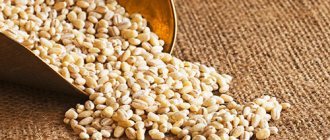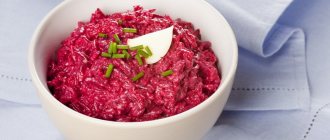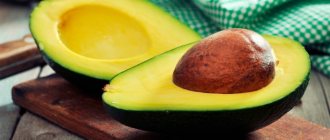Why should a nursing woman not eat this natural delicacy?
Until recently, any pediatrician would have said that melon is contraindicated for breastfeeding mothers, even if there are no diseases. There are a number of reasons for this:
- If melon enters the baby's body with mother's milk, it can cause bloating, colic, diarrhea, and even vomiting;
- diathesis from aromatic delicacies occurs in children prone to allergies;
- there is a risk of poisoning (if the melon crop was grown using nitrates).
But modern pediatricians advise not to give up so quickly on the idea of enjoying natural sweetness while breastfeeding. After all, the benefits of melon can hardly be overestimated.
Breastfeeding period
In the first days after childbirth, the nutrition of a woman who has given birth is limited as much as possible. After the baby reaches 3 months, new foods can be gradually introduced into the diet. At this time, the baby’s immune system begins to form, and he will be able to respond more correctly to innovations.
Conventionally, the lactation period can be divided into the following stages:
- from the moment the baby is born until he reaches 1.5 months;
- from 1.5 to 3 months;
- from 3 to 6 months;
- from 6 months to the end of breastfeeding.
Each subsequent period, the mother’s menu can be replenished with new products. By the time the baby turns two months old, his digestion is already more or less established, and after the third month, colic disappears. After six months, you can introduce any complementary foods.
Nutrition in the first days after childbirth
In the first day after childbirth, the female body experiences a period of hormonal changes, and intestinal masses in her body can interfere with the process of producing prolactin and oxytocin, which can cause a decrease in lactation. Therefore, food intake on these days should be limited.
Taking a large volume of liquid will help remove all toxins from the body of a nursing mother faster. During this period, a decoction of rose hips and dried fruit compotes will be useful, but sweet drinks and juices are strictly contraindicated.
Drinking nettle or chamomile tea will be very useful, as they will reduce the risk of bleeding. A decoction of parsley stems, hawthorn fruits and lemon balm leaves will calm the nervous system of the postpartum mother.
The main dishes of women after childbirth are soups with vegetables and water porridges flavored with a small amount of vegetable oil. For dessert you can offer baked bananas and apples.
Potato or zucchini puree is recommended. Flour products should consist of hard pasta and spaghetti.
To combat constipation, to which the female body is susceptible after childbirth, boiled beets and seaweed, as well as dried prunes “in limited quantities,” can be used.
Product norm
Starting from the third week, a nursing mother can expand her diet and increase the amount of food she eats.
Approximate amount of food per day for a woman breastfeeding a month-old baby:
- recommended porridge: 50-60 g;
- durum pasta: 50-60 g;
- meat, fish: 150-180 g;
- vegetables and fruits: 200-300 g;
- cheeses: 50-60 g;
- sour cream: 20-30 g;
- cottage cheese: 150-200 g;
- kefir, fermented baked milk: 250-300 ml;
- drinks: 1.5 l.
Beneficial properties of the fruit
- A high content of folic acid, which a young mother needs to improve memory and mood, and, therefore, helps to avoid postpartum depression.
- Vitamins C, B9, beta-carotene in melon strengthen the immune system, improve the health of hair and skin.
- Diseases of the kidneys, cardiovascular system, and liver are prevented by iron and potassium, which are also present in the aromatic sweetness.
- The silicon content normalizes the functioning of all internal organs.
- The properties of melons to cleanse the body of toxins, waste, and improve intestinal motility are familiar to many.
- It is very important for a newborn to receive enough breast milk.
- Eating melon increases milk production.
These benefits force pediatricians to argue that a young mother can and should eat this delicacy, but at the same time follow some rules.
Arguments for: beneficial properties of melon
Melon is a false berry related to pumpkin and cucumber. Ideally, it is round, possibly oblong, even yellow in color, without dents or suspicious spots, has a pleasant aroma and makes a dull sound when tapped. The aroma of a fresh, ripe melon can have notes of vanilla, pear, honey, and even pineapple, and the pulp is juicy, tender, with a honey flavor. So, can a nursing mother have melon? Is it good for the child?
Firstly, melon pulp is low in calories, so it is a dietary product. Secondly, in breastfeeding women, it increases the flow of milk during lactation and enriches it with useful substances, such as:
- vitamins of groups A, B, PP, C, E and beta-carotene;
- organic acids;
- monosaccharides;
- saturated, polyunsaturated fatty acids;
- enzymes;
- useful substances: zinc, sulfur, cobalt, iron, silicon, manganese, copper, sodium, chlorine, potassium and calcium.
In addition, melon contains fiber, which has a positive effect on digestion during breastfeeding. Fiber and enzymes improve intestinal microflora and prevent the formation of excess weight and cellulite. In addition, it significantly replenishes the body’s water supply, cleanses the kidneys of deposited salts, and removes harmful metabolic products from cells. Melon pulp also expels parasites from the body and prevents helminthiasis.
The vitamins and microelements contained in melon pulp have a very good effect on the body of a nursing mother and a newborn baby.
Vitamin C and iron increase hemoglobin in the blood, beta-carotene stimulates the immune system and has antioxidant properties. Vitamin C has an anti-inflammatory effect and can effectively resist cold and flu viruses, and this is important for a nursing mother and child.
Vitamin B8 removes “bad” cholesterol, cleansing blood vessels and thinning the blood, and also improves the functioning of the nervous system, ensures good sleep for a nursing mother, stimulates hair growth and improves vision, and vitamin B9 helps the skin protect itself from the harmful effects of ultraviolet radiation.
Silicon and zinc increase skin elasticity, which is important for recovery after childbirth.
Magnesium stabilizes the nervous system and brain function, preventing depression and nervous disorders during breastfeeding, and also relieves muscle spasms and has a positive effect on the heart.
Melon is also useful for babies: it contains folic acid, which improves the mood of the mother, and therefore the baby, avoids postpartum depression and makes the baby calmer. The baby's immunity increases, and he is less at risk of colds.
Doctors recommend eating melon both during pregnancy and while breastfeeding. So, we can conclude that melon is useful during lactation.
Safety rules for mother and baby
Melon is useful during breastfeeding if the young mother takes precautions.
First, you need to protect yourself and your baby from poisoning during feeding.
To speed up the ripening and growth of melons, unscrupulous producers use nitrates. These substances cause poisoning. In early and mid-summer, there is a high chance of purchasing fruit with a high nitrate content. You can enjoy melon without fear at the end of August.
It is better to choose a fruit without spots, cracks, and with a dry tail. This is a guarantee that the melon has ripened on the melon tree even before cutting and no harmful bacteria have entered it.
Before cutting the fragrant fruit, you must wash it. If the melon turns out to be unripe, it is better for the nursing mother to refuse to eat it. It is not recommended to eat even ripe fruit on an empty stomach. You should not combine melon with other foods, especially when breastfeeding. It is best if the healthy treat is consumed as a snack between, for example, breakfast and lunch.
You can try eating a small piece of natural sweetness after your morning meal. This is necessary to monitor the newborn’s reaction to an unfamiliar product during the day. If a rash does not appear on the child’s skin, there is no diarrhea or vomiting, bloating, or colic, the next day you can eat a little more melon. But you shouldn’t get carried away with it. Indeed, in this case, the baby may experience negative reactions during breastfeeding, which are best avoided.
For mothers, excessive consumption of melon can also result in a number of problems. First of all, excess weight. After all, the aromatic delicacy contains a high content of easily digestible carbohydrates. But they can help a young mother, while breastfeeding, give up confectionery products that negatively affect the baby’s digestion. If the baby does not have a reaction to melon, it can replace candies, cookies and other sweets.
Whether or not to eat melon during lactation is determined by each woman for herself. The natural delicacy contains many beneficial properties, but the baby and his well-being come first. After all, there is nothing more important for a mother than the health of her own baby.
More information about nutrition during breastfeeding at vskormi.ru.
The lactation period is very difficult, since a woman must adhere to proper nutrition while breastfeeding, avoiding foods that can cause allergies, bloating and stomach upset. Fresh vegetables and fruits should be consumed with extreme caution. But when it’s August, melons and melons, which fill almost all retail outlets, become a temptation. Read more about whether a nursing mother can eat melon and how to use it correctly so as not to harm the baby.
How should a woman eat during lactation?
The quality of milk produced depends on the food consumed by a woman who is breastfeeding. Its composition can affect both the condition and health of her child. In the first months after the birth of a baby, a woman’s body produces up to two liters of milk, so a nursing mother needs to restore lost energy in a timely manner.
Experts recommend establishing a strict diet that includes eating every 4-5 hours.
One of the principles of proper nutrition while breastfeeding is not to overeat, but also not to go hungry.
What can a nursing mother eat in the first month after giving birth?
In the first weeks after childbirth, a woman should eat exclusively high-quality and fresh products. The most correct would be to eat meat, vegetables, and fruits brought from the village, since in this case the likelihood of the presence of dangerous pesticides in them is extremely low. Fruits and vegetables must be grown in their native region and be included in the menu strictly in season, “to avoid the receipt of a large percentage of nitrates.”
During this period, a woman needs a balanced and nutritious diet, with sufficient protein, fat and carbohydrates.
Each new product must be included in the menu gradually and extremely carefully. At the same time, it is worth conducting strict monitoring of the baby’s body’s reaction: how often does he burp, are there any rashes on the skin, is colic bothering him, how sound is his sleep, etc.
According to experts, the diet of a nursing woman should consist of:
- boiled fish of low-fat varieties “pike perch, hake, pollock, pike perch, etc.”;
- meat dishes “lamb, veal, rabbit and poultry” with low cholesterol;
- thermally processed dairy products in the form of kefir, fermented baked milk, natural yogurt “should be consumed with caution, as they can cause stool upset in both the postpartum mother and the baby”;
- soups and porridges “buckwheat, pearl barley, barley, oatmeal” cooked in water;
- bran bread or crackers;
- baked bananas and apples;
- mashed potatoes.
After some adaptation of the “2-3 months” of the child, you can add eggs, dairy-based sausages, dried fruit compotes, dry cookies, some nuts and bee honey, butter, pickled cucumbers, dumplings and dumplings, hard cheeses, to the mother’s diet. lightly salted herring.
Stimulation of intestinal function in mother and her baby
For good functioning of the gastrointestinal tract, it is necessary to include fiber products “zucchini, carrots, beets, pumpkin” in the diet of a young mother. The simultaneous intake of vegetables should be no more than 150-200 g.
To meet the need for glucose, a nursing woman is recommended to consume green, white or yellow fruits daily.
Is it possible to eat melon while breastfeeding?
Melon is not only very tasty and aromatic, but also beneficial for the female body, because it contains many micronutrients. But there is a lot of controversy regarding its use during lactation.
Most pediatricians do not recommend adding it to the diet in the first month after birth, since the newborn still has a weak digestive system that can only digest light foods.
Others are confident that if you follow a diet, you can still eat melon when feeding, but in small quantities and with the right choice of fruit.
Important! This statement about moderate consumption of melon applies only to seasonal fruits. It should not be introduced into the diet in winter or early spring, since growing fruits out of season is accompanied by the use of chemicals.
Arguments “Against”: when it is undesirable to eat melon
However, such a wonderful product as melon, unfortunately, may have contraindications:
- increases blood sugar, which means it is contraindicated for diabetics;
- Doctors prohibit the use of melon for inflammatory diseases of the gastrointestinal tract, ulcers and gastritis, because it can aggravate the symptoms of the disease. The baby’s intestines are still very tender, and the sugar contained in this melon culture causes fermentation and can lead to diarrhea and painful colic;
- increases bile secretion, contraindicated for those with liver and gallbladder diseases;
- melon is considered an allergenic, so you need to be careful by introducing it into your diet slowly and monitoring the body’s response;
- there is a risk of poisoning from chemicals used as fertilizers
The first months of life - most doctors, including Dr. Komarovsky, claim that in the first one or two, or preferably three months, it is better for the mother of a newborn to avoid eating fresh melons.
When breastfeeding, you can eat dried melon slices from the third month. But it is best to wait until the fourth month, or even six months.
If there are no contraindications, it is still recommended to follow some rules: choose the right one, do not mix melon with baked goods or dairy products, do not drink water after eating it, and, of course, do not overdo it with this wonderful delicacy. Then you will be able to avoid weight gain and digestive problems.
The benefits of melon for a nursing mother
If we talk about the benefits of a large sweet fruit, then it certainly has a positive effect on the human body, since it contains a large amount of vitamins and microelements.
This melon fruit is a source of carbohydrates, and its rich-sweet taste indicates the presence of organic sugars. Glucose is very useful for a woman, especially after childbirth, as it has a positive effect on the emotional state, allowing you to cope with postpartum stress.
Melon also contains useful acids, in particular folic acid. And a lot of fiber. The positive thing about its use is that all the microelements and vitamins contained in its composition will certainly end up in breast milk.
The pulp of the fetus consists of almost 90% liquid, which contributes to the flow of milk. It also has a mild diuretic effect, allowing you to get rid of swelling.
During lactation, all the most essential microelements for the female body pass into milk, which has a detrimental effect on the mother’s appearance. And the presence of beta-carotene in the fruit helps improve the condition of hair, nails and complexion, maintaining a beautiful appearance.
What are the benefits of melon for babies?
Melon during breastfeeding can also have a positive effect on the baby’s condition if you follow the rules for its use.
Adding fetus to the diet of a nursing mother increases the production of the hormone serotonin in the blood. It not only improves the mother’s mood, but also, when included in milk, has a beneficial effect on the child’s mood.
The fiber contained in the composition improves digestion for mother and baby, but it is necessary to dose the consumption of melon, as it can cause loose stools in the child.
Saturation of milk with vitamin C helps strengthen the child’s immunity, and iron and potassium have a beneficial effect on blood formation, increasing hemoglobin and strengthening the cardiovascular system.
How to choose melon for a nursing mother
The main rule for eating melon is that it is healthy and does not cause harm while feeding the baby. Unfortunately, today there are many unscrupulous manufacturers who are trying to increase their profits by improving the taste and external qualities with the help of chemical nitrates. Using this method, grown melon can seriously harm not only the mother, but also the child, causing indigestion or, even worse, causing poisoning.
Attention! For a nursing mother, it is recommended to consume melon only during the ripening season of these fruits; at other times, it is better not to add it to the diet.
It is strictly not recommended to purchase melons with cracks, dents, damage, or cut in half. Since on cracks and cuts in the fetus, pathogenic microbes begin to spread very quickly, which, if they enter the body, can cause an infectious disease.
A nursing mother can only eat a fully ripe melon, so when choosing a fruit, you should definitely check it for ripeness:
- the ripe fruit has a pronounced melon aroma;
- the peel should be elastic when pressed;
- when tapped, the sound should be dull;
- the stalk must be dry (naturally dried).
And most importantly, you should purchase melons only in special fruit and vegetable departments.
How to choose the right melon?
- You need to buy melon at the end of August, and it must be ripe.
- You can tell whether a melon is ripe or not by its aroma. If a melon has a pleasant aroma, then you can safely buy it.
- Also, the ripeness of a melon can be determined by patting its surface; if this produces a dull sound, the melon is ripe.
- You should not choose melons with spots and cracks on the skin, as harmful bacteria penetrate through them.
- Can a nursing mother eat watermelon?
- What fruits can a nursing mother eat?
- Nutrition during breastfeeding - about different approaches and ways to introduce new foods into the diet.
Author: Lyudmila Sharova
to protect your baby from allergies, colic and abdominal pain. GUIDE to nutrition for nursing mothers Click and get
How to introduce melon into the diet of a nursing mother
Women who give birth in early summer can, if desired, introduce melon into their diet during breastfeeding, but this should be done while observing a number of rules:
- You should use melon with extreme caution if your child is under 3 months old. Most pediatricians are completely against the use of this product up to 3 months, since it is during this period that the process of establishing the baby’s digestive system occurs.
- If it was decided to introduce melon into the diet, then this must be done gradually, observing the baby’s reaction to the new product. You should start with a small piece, and if you react well to the new food, you can gradually increase the amount. Thus, when breastfeeding, a nursing mother can consume up to 200-250 g per day no more than 3 times a week.
- It is under no circumstances recommended to consume melon with other foods. The most ideal option is to eat it as an independent dish during the period between main meals (between lunch and dinner). So, until the evening you can observe the child’s reaction. You should not drink melon with water, as this will slow down the process of its absorption.
- You should avoid eating melon before bed or immediately after eating. Indeed, during this period, the process of digesting this product will be complicated.
Is it possible for a nursing mother in the first month?
Melon has a sweet taste and fragrant aroma, and the beneficial substances contained in melon can have a beneficial effect on the female body .
However, the use of this product while breastfeeding causes a lot of controversy, since diet supporters believe that it can cause such severe reactions in the child as diarrhea and vomiting.
Some are confident that
the fruit of the pumpkin family can be eaten in the first month after birth, observing the following requirements :
- do not overeat - excessive amounts of such food can harm the health of mother and baby;
- first check the child’s reaction by eating a small piece;
- make sure that the mother and her relatives do not have a predisposition to allergies;
- eat seasonal products and do not buy imported melon in winter or early spring.
Attention! Experienced pediatricians recommend that mothers be patient and adhere to a strict diet for the first month after childbirth, since the weak digestive system of a newborn can only digest light foods.
From what day after birth should it be introduced into the diet?
Melon contains a large amount of sugars, which are fast carbohydrates and, penetrating into breast milk, cause fermentation in the stomach. Because of this, increased gas formation and colic appear. In addition, the pulp can cause food allergies , manifested by:
- rash;
- swelling;
- rhinitis;
- itching;
- difficulty breathing.
Given these factors, mothers should exercise caution and wait until the child’s immunity is stronger . Experts advise breastfeeding women to start trying melon no earlier than 3 months after giving birth. Some are completely sure that the product should be introduced starting from the 6th month of the baby’s life.
In what cases should you abstain?
Since melon itself is a product that can be consumed in moderation during feeding, there are cases when it is contraindicated:
- with gastritis, peptic ulcer or colitis in the mother;
- for diabetes mellitus;
- when diathesis and an allergic reaction occurs in a newborn;
- for bloating, colic and indigestion in a child;
- if the nursing mother is overweight.
If a child or mother has signs of poisoning or an upset stomach, under no circumstances should you eat melon, as it can further worsen the condition and cause vomiting and diarrhea.
A nursing mother can eat melon, but with extreme caution. And only if the lactation period coincides with the period of ripening of these fruits. Before adding this product to your diet, be sure to consult your pediatrician or nutritionist to avoid harmful effects.
Melon is tasty, juicy, healthy and loved by everyone. In addition to the fact that its fruits have an amazing taste and smell, it can also boast of its beneficial properties. It is simply a storehouse of useful substances - vitamins, minerals, microelements.
Characteristics and main properties of the product
Melon is a melon crop that has been cultivated for a long time. Its fruit is called pumpkin. Nowadays it can no longer be found in the wild. The first plants were domesticated many years ago in Indian and Central Asian countries. It was from there that melon began to be exported and distributed throughout the world.
There are a lot of varieties of it today. They differ in shape, taste, color, density. In summer, on the shelves you can find fruits shaped like a ball or a cylinder, weighing from 1 to 15 kg, of various colors - green, yellow, lemon, brown, striped, white. Under the thin skin are hidden pulp, which has a pleasant aroma, and seeds. Since melon has excellent taste characteristics, it is widely used in cooking. In addition to using it as an independent dish, it is dried, dried and canned, jam is made from it and honey is made, sorbet and candied fruits are made.
The main part of the pumpkin is water, almost 90% of it is contained in the pulp.
In addition to liquid, the fruit contains:
Find out in more detail what vitamins are in melon.
In addition, melon boasts a large assortment of vitamins:
- A;
- IN 1;
- AT 2;
- niacin (B3 or PP);
- folic acid;
- WITH;
- E.
It also contains a number of macro- and microelements:
- sodium;
- calcium;
- iodine;
- potassium;
- magnesium;
- phosphorus;
- iron;
- cobalt;
- copper;
- manganese;
- fluorine;
- silicon;
- zinc.
Let's consider how the fragrant fruit affects health. Since it is consumed mainly fresh, the vitamins are not destroyed, but are absorbed by the body. This is a low-calorie product: 100 g of pulp contains approximately 38 kcal.
A ripe melon can safely be called a cure for many ailments. The enzymes present in the fruit have a beneficial effect on the gastrointestinal tract, helping to get rid of various digestive tract disorders. Fiber, which is present in the aromatic pulp, affects the improvement of intestinal microflora, and also takes part in the removal of “bad” cholesterol from the body.
Important! It should be remembered that folic acid is destroyed during heat treatment. Melon is recommended to be consumed if there are stones and sand in the kidneys or bladder, as well as for the treatment of rheumatism, gout, diseases of the cardiovascular system, to strengthen the nervous system, enhance the effect of antibiotics, and for a diuretic effect. The presence of melon in the diet will strengthen the immune system, increase hemoglobin levels, and improve appearance.
Who is prohibited from using it?
In addition to beneficial qualities, melon also has negative properties that are dangerous for the stomach. First of all, melon is a heavy food, and the gastrointestinal tract works for quite a long time to digest it. Eating a lot of pulp at one time is not recommended. Because of this property, it should be eaten separately and not mixed with other products.
This fruit does not combine or has poor compatibility with some other products. For example, if you take it with milk, the reaction will be the same as if you eat a cucumber and drink milk together - that is, it will give the same result as a laxative.
It is best to eat melon separately from other foods. It is strictly contraindicated for people with gastrointestinal diseases such as gastritis, gastric and duodenal ulcers, and chronic colitis. The consequences can be very severe, even death is possible.
In addition, its pulp is full of simple carbohydrates. Therefore, diabetic patients should consult their doctor whether this product can be eaten. And those who want to lose weight need to eat it carefully and not overeat.
Did you know? The Yubari King melon is considered the most expensive in the world. Its fruits are sold at auctions, and the price of a pair of them can reach 20 thousand dollars.
What are the prohibited combinations?
This fruit has become a favorite dessert for a very long time. On the tables of nobles and noble persons, melon occupied a place of honor. But then hardly anyone knew about healthy eating and that improper consumption of the delicacy could even be fatal. However, it gradually became clear that this juicy and aromatic pulp is not exactly a dessert.
This dish can be enjoyed when the stomach is not overloaded and is ready for the next meal. But if you don’t adhere to this rule and eat it along with other foods, problems will not keep you waiting. Everything that has been eaten turns into a heavy mass in the stomach, which will ferment and be poorly digested. In this case, the consequences in the form of nausea, diarrhea, colic and bloating will occur very soon. Therefore, it is very important to know what exactly should not be consumed with this fruit.
Let's look at why you shouldn't eat anything immediately after melon, as well as what you shouldn't eat it with and what it's incompatible with:
- In combination with milk or fermented milk products, it has a strong laxative effect. With sour cream, cottage cheese, kefir, and yogurt, frequent visits to the restroom are guaranteed.
- Many people are interested in what kind of wine melon can be combined with, and whether it is worth using melon as a snack with wine and champagne, with beer, and whether cognac and vodka are suitable for it. The medical answer is absolutely not! This fruit and alcohol are incompatible. If you neglect this rule, you can get constipation or diarrhea, and also end up in a hospital bed with gastric lavage.
- Nursing mothers should refrain from fragrant fruits during feeding: the baby will have diarrhea, which may result in dehydration.
- You should also not drink water with this fruit, as colic, diarrhea or fermentation may occur.
- The combination of melon and honey is sometimes called an “explosive mixture”, since after consuming these products there is a risk of intestinal obstruction. This is especially true for those people who have had abdominal surgery and have scars and adhesions on their internal organs. Of course, after honey and melon, such a reaction may not occur, but it’s still better not to risk it.
Find out if you can eat melon on an empty stomach.
What can you combine melon with?
If you want to diversify your menu and prepare some kind of melon dish, there are many recipes. You can, for example, make a salad with fruit. Which fruit will taste best with it is up to you to decide, depending on your own preferences. It goes well with all berries, apricots, peaches, pears, pineapples and bananas. It is also worth preparing a melon salad with cheese and grapes.
Many people believe that melon and fish are incompatible. However, in the Middle East it is popular to serve this fruit as a side dish with fish. In Mediterranean countries, it is traditional to serve it with meat and ham; in Spain you can often see melon with jamon, and in neighboring Italy - with prosciutto.
However, although there are many recipes and combinations, nutritionists advise caution or not combining fresh melon with other products at all. With bread you can eat jam or jam made from the aromatic fruit, drink tea and coffee.
Did you know? 25% of the melons consumed in the world come from China. This country grows 8 million tons of melons annually.
How to use it correctly
Due to the fiber contained in melon, it is considered a rather heavy product. Therefore, it is best to use it on an empty stomach in the morning or in between meals. The interval should be 2 hours after or after eating, otherwise a feeling of heaviness in the stomach cannot be avoided.
It is worth eating this fruit in small portions - an excess of minerals and vitamins can harm the body. And due to the very high glycemic index of melon, after an hour the body may require the next meal.
Important! If you eat a small amount of the fruit at night, you can overcome insomnia. However, the pancreas will be under strain, so you need to be careful not to eat too much of the juicy pulp. After consuming it, it is better to refrain from fermented milk products. What is definitely not recommended to mix the fruit with is cottage cheese, kefir and eggs, so as not to cause violent gas formation in the stomach.
The aromatic product can be consumed with coffee. When brewing coffee in a Turk, you should add a couple of small pieces of dried or fresh pulp, and then drink the coffee and enjoy the unusual taste of the drink.
Tips for choosing a good melon
Let's consider the main criteria for choosing this fruit:
- It must be purchased “in season,” that is, during its natural ripening. The most suitable period is from July to September.
- Smell the fruit you like. The pleasant aroma that comes from the peel indicates ripeness.
- The largest amount of pesticides and nitrates accumulates in the peel and in the stem area. Therefore, when eating, you need to cut off about 1 more cm of pulp from the skin in order to rid the body of possible toxic substances.
- The appearance of the fetus must be ideal. There should be no cracks, cuts or dents on it. If there are flaws, it means there are harmful microorganisms inside.
- The aroma should be bright and rich.
- The peel should be soft, the stalk should be thick, about the thickness of a pencil.
- When tapped, the pumpkin should make a dull sound.
- When fully ripe, the top layer, if scraped, can be easily removed.
Read what to do with unripe melon and how to choose a ripe one.
So, melon is a very healthy and nutritious fruit. It helps in the treatment of many ailments and also strengthens the human immune system. But you need to be careful and careful when consuming it and, if possible, not mix it with certain products.
Loading… Pregnancy and, especially, the subsequent birth of a child radically change a woman’s life. From now on, everything, from the daily routine to the choice of food, is subject to the interests of the little person.
If the first changes in the diet occur several months before giving birth, then after them the nursing woman has to reconcile her own preferences with the safety of the child, because toxins and allergens can enter his body through milk.
A nursing mother unwittingly faces a serious problem, because her diet should be as varied and healthy as possible, but not pose a danger to the baby who depends on her.
How to choose a melon
In order to buy a ripe product that is not loaded with pesticides, a young mother should know when the melon ripens, what it looks like when ripe, and what aroma it gives off.
How to choose the right fruit so as not to harm the health of a nursing mother and baby?
- Melons grown in open areas appear on markets for sale no earlier than the end of August;
- The fruit has a slightly dried tail;
- They are bright yellow in appearance;
- When cut, they do not have a greenish strip along the edge of the peel;
- Melon consumed by a young mother should not have chips and cracks in which microbes and bacteria accumulate from the process of spoilage of the product and its rotting;
- The purchase of fruit must be carried out in places with certificates for the product being sold;
- If a woman has a private house or a summer cottage, then it is better to try to grow melon on her own at home;
- When you tap the melon with your palm, it will make a dull sound;
- Ripe melon is a fragrant melon;
- When ripe, the fruit has different sizes, from the smallest to the very large; when choosing from the market, a breastfeeding woman should choose a medium-sized product;
- If the melon has a very beautiful appearance without a single streak on the peel, then this means that it is stuffed with nitrates and is not worth buying.
Is it possible to have melon while breastfeeding?
In summer, it is most difficult to resist the temptation to eat aromatic fruits and berries, many of which can pose a potential danger to an infant. Melon is no exception. With a lot of useful properties, the fruits contain a lot of sugars and fiber, and can also cause allergic reactions.
Therefore, doctors are wary of this product in the diet of both pregnant women and women who have recently given birth. And to the question “Can a nursing mother eat melon?” Doctors sometimes find it difficult to give a definite answer. To understand this issue, you need to evaluate all the positive qualities of the fruit and compare them with the existing risks.
How to properly introduce melon into your diet?
Before deciding to try melon, a nursing mother should make sure that her baby is healthy, his stool is normal, and there are no rashes or other manifestations of allergies. This determines whether you can eat melon or not. If other fruits have already been introduced into the diet before and the baby’s reaction was normal, then most likely the introduction to melon will go well.
You should start with a small piece, preferably in the morning. If after this there are no allergy symptoms, bloating or crying from abdominal pain, then your introduction to the new product went well. Then the next day you can eat a piece of melon again and observe. You need to continue this way for several days, gradually adding pieces, by the end of the week you can bring their number to four. Still, you need to know when to stop and not overdo it. So melon is consumed during lactation without harm to health.
If any disturbing symptoms appear, then you should stop eating melon, and you can try again no earlier than two weeks later. And if the negative reaction happens again, then wait another month or two.
If nausea, vomiting, diarrhea, or sharp pain in the abdomen suddenly appear - this is poisoning, you must urgently take an adsorbent and call an ambulance.
During the period of introducing melon into the diet, you should not try any other new dishes to make sure that the reaction (if any) is to it and not to something else.
Risks of eating melon by a nursing mother
The disadvantages of melon when breastfeeding can be considered:
- increased content of carbohydrates, which through mother’s milk can provoke the formation of gases in the baby’s digestive system and cause painful colic;
- the ability of melon to cause symptoms of food allergy in both the mother and the breastfed child, expressed in skin rashes and swelling, rhinitis, difficulty breathing and itching.
In this regard, it is better to be careful and for a nursing mother not to eat melon, at least until the child reaches three months of age and his immunity gets a little stronger. Melon is especially dangerous for children whose one or both parents are prone to food allergies, even to other types of foods. In such children, acute reactions of the body to exposure to allergens are more common than in children of healthy couples.
In addition, a mother who is wondering whether melon can be consumed while breastfeeding should not forget that her own health can be undermined if she is diagnosed with one of the following diseases:
- diabetes;
- gastritis in the acute stage;
- peptic ulcer.
Even with occasional stomach upsets, to which in ordinary life people attach little importance, melon can cause complications and prolonged diarrhea in a nursing mother, which affects both the well-being, the quality of the milk, and the health of the baby.
Useful properties of melon
Nutritionists highly appreciate the beneficial and nutritional properties of melon. If we break down the composition of this solar fruit, we will see only the substances our body needs:
- microelements and macroelements - iron, calcium, potassium, sodium, magnesium and iodine;
- vitamins – A, C, P, E, B9 (another name is folic acid);
- fiber;
- carbohydrates.
Melon during breastfeeding will help a woman feel a surge of energy, and the calcium in this fruit helps strengthen teeth and hair, which is extremely important for a nursing mother. Having tasted mother's milk, the baby will also receive a portion of nutrients and microelements. However, there are rules and contraindications that you need to remember before enjoying this product.
Beneficial properties of melon during breastfeeding
If there are no contraindications, and doctors see no reason to deny a nursing mother melon, we can remember not only the excellent taste of honey fruits, but also the benefits they can bring to both the woman and the baby.
Melon is a fruit containing:
- a large amount of folic acid, which is so important during pregnancy and breastfeeding;
- many other vitamins, such as ascorbic acid and beta-carotene;
- vegetable proteins and organic acids, minerals and pectins;
- digestible sugar, which helps quickly restore the strength needed by a young mother;
- fiber, which promotes intestinal function, removes toxins and removes excess cholesterol;
- iron and potassium, which support the body in case of threat of anemia, cardiovascular diseases, excessive stress on the liver, kidneys and joints.
Among the positive aspects is that melon can cause increased production of breast milk in a nursing mother.
The smooth functioning of the body and the good mood of the mother are the key to the rapid growth and development of the child, therefore, in moderate quantities and under the supervision of a physician, you can eat melon while breastfeeding. Indeed, in addition to the listed advantages, ripe pulp has a slight diuretic effect and quietly cleanses the body of harmful accumulations and fights swelling.
Benefits for mother and child
Nutritionists speak positively about the fragrant honey product, since its pulp contains a lot of useful substances that have a beneficial effect on the body.
So, melon contains the following substances :
- fiber (helps remove cholesterol, improves the functioning of the digestive system, restores intestinal microflora);
- folic acid (improves the well-being of a nursing mother and promotes the normal development of the newborn);
- vitamins A, P, E , as well as C, which strengthens the immune system and helps fight colds;
- potassium (normalizes the functioning of the cardiovascular system);
- carotene (improves the condition of hair and skin);
- silicon (ensures balanced functioning of all internal organs);
- iron (improves the functioning of the kidneys, liver and takes part in the blood formation system).
Also, melon in the diet of a nursing mother stimulates milk production , has a mild diuretic effect and helps fight edema. And the mother’s excellent mood and the smooth functioning of the body are the key to the proper growth and development of the child.
When and how can you eat melon while breastfeeding?
When cutting the juicy fruit into slices, it is important to remember that in order to avoid unpleasant consequences when eating melon, it is better to follow simple rules:
- The melon must be ripe, of high quality and not cold, so as not to cause irritation of the gastric mucosa when it enters the digestive system. To avoid poisoning, a nursing mother should not eat melon that has been cut in advance and has had time to sit in the refrigerator.
- Before use, wash the melon in running water using a washcloth or thick sponge, and then dry it with a soft cloth.
- You cannot eat melon on an empty stomach or at night, in which case you will experience discomfort in the stomach.
- You should not eat melon with foods such as rye and wheat bread, baked goods, milk and cream, fatty meat and fish.
- As an independent dessert, the fruits of melons, including melon, are eaten between main meals, for example, after breakfast or lunch as a light snack.
What time of day is best to eat melon?
Since it is important for a young mother to see the reaction not only of her body to the introduction of a new product, but also of the child’s, it is reasonable to eat a slice of melon in the first half of the day. In this case, the baby will be under supervision all the time, and any alarming symptoms will not go unnoticed.
If redness appears on the baby’s face, a runny nose begins, or other signs of an allergic reaction appear, the mother can quickly turn to specialists for help and take emergency measures. Obviously, in this case, as in a situation where the woman’s own well-being deteriorates, the answer to the question: “Can a nursing mother have melon?” will be negative.
At the first signs of an allergy or food poisoning, it is extremely important to immediately seek medical help and remove dangerous substances from the body as quickly as possible.
In addition, the sugars contained in it may not become the source of energy a woman needs, but will be deposited on the waist. And the digestion of fiber takes several hours, so eating a small slice of melon at night can deprive a woman of proper rest.
If the baby does not have a negative reaction to a new product on the nursing mother’s menu, you can eat more than just one slice of melon, but gradually increase the amount to 2-3, constantly monitoring the baby’s well-being. The maximum daily portion of melon should usually not exceed 250–300 grams, but even here, in order to avoid acute reactions of the body, it is better to consult with your doctor in advance.
When a nursing mother should not have melon
Women giving birth in the summer try to protect themselves from eating fruits and vegetables, citing fear of harming their baby. They are intimidated by pediatricians who themselves do not know whether it is possible to eat melon during lactation or not, and with the help of the ban they are trying to relieve themselves of blame in case of a reaction to the product consumed by the mother. This product belongs to a number of melons. Melon contains numerous vitamins and minerals that are beneficial for the body of a woman and baby.
Not all mothers can eat sweet pulp. Let's look at the main reasons for the ban:
- Melon contains a lot of dietary sugar, which can cause a reaction in a newborn baby in the form of childhood diathesis;
- If it enters the digestive system, the product provokes gas formation, which will cause the baby to suffer and scream from abdominal pain;
- If the first signs of an allergic reaction are detected in the mother or child, it is necessary to stop using the product;
- If a woman suffers from diabetes, she is strictly forbidden to eat sweet fruit;
- If a young mother has acute gastritis, eating melon is prohibited.











